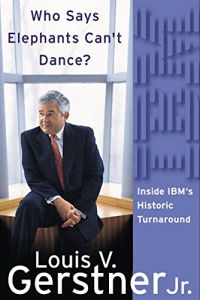
Who Says Elephants Can't Dance?
Leading a Great Enterprise Through Dramatic Change
First Edition: 2002 подробнее...
Published by arrangement with Harper, an imprint of HarperCollins Publishers
ISBN: 9780060523794
Pages: 304
Recommendation
Legendary CEO Louis V. Gerstner Jr. pulled off the turnaround of the century by bringing IBM back from near bankruptcy. He completely remade IBM, a monumental task considering its size, its hallowed traditions and mission, its strong corporate culture, and the remarkable challenges it faced in a rapidly evolving marketplace. He details the steps he took to resurrect IBM and restore its legendary leadership position, and he explains why he chose a bold, risky path to strengthen and unify the iconic company when astute observers believed it had become an irrelevant corporate relic. Gerstner says that even though he wasn’t an author, he decided not to use a ghostwriter. Be glad he stuck with his own voice. getAbstract finds that he has written a superior business book: analytical, well organized, focused and methodical – a work of masterful storytelling in straight-shooter prose. Current and aspiring CEOs can learn from Gerstner’s war stories and from his visionary leadership. This may be an ironic twist, considering Gerstner’s famous quote that IBM didn’t need vision – it needed superior strategizing and marketplace performance. As it turns out, he supplied all that and vision, too.
Summary
About the Author
Louis V. Gerstner Jr. was IBM’s chairman and CEO from 1993 to 2002. Previously, he served as chairman and CEO of RJR Nabisco, as a senior executive at American Express, and as a consultant at McKinsey & Company.







Comment on this summary